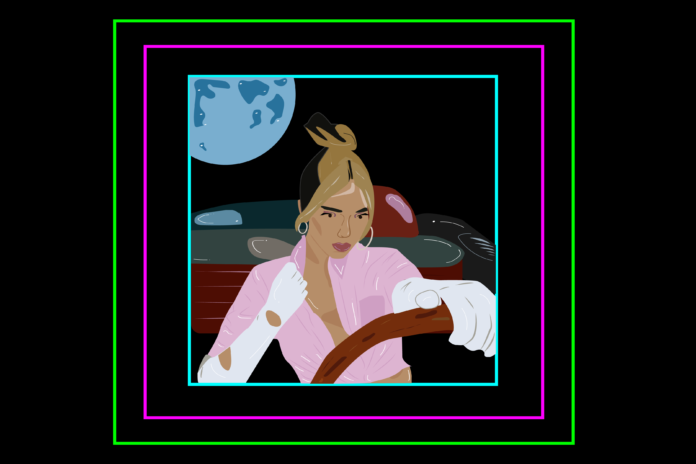Confidence that’s changing the pop game
The disco alpha female Dua Lipa early-released her second studio album, “Future Nostalgia” on March 27. From the moment of its release, many people, including myself, had a dance party of one in their bedrooms, ushering in a new reign of pop excellence with disco-synth sounds framing explicit, unrestricted lyrics of female empowerment. The album currently resides at No. 1 in the UK and No. 3 in the world in Spotify streams.
Lipa makes it clear that she doesn’t need a man to confirm her worth nor confine her success because of insecurity and gender discrimination. She does this with a maturity that claims attention, rather than asking for it with batting eyelashes. Everything she does means to embrace and take care of herself, regardless of who it happens to satisfy. She highlights her agency while pointing out that she’s only willing to carry her own and meet halfway — anything else isn’t even worth the nostalgia.
The album envisions a universe where Lipa can have a star-crossed moment like in “Cool,” but now she has learned her boundaries. It’s an important statement that claims she can ask for men to see her as desirable, but not an object. Lipa can carve her own path without being boxed into a pre-approved male narrative that dangles above the fire in “Good in Bed.”
The shining, Grammy-worthy track on the album is undoubtedly “Don’t Start Now.” It’s a testament to the sharp, sucker-punching lyrics that were present in her debut album. There’s genuineness in Lipa’s honest words of trial and tribulation when she sings, “Did the heartbreak change me? / Maybe / But look at where I ended up.” The track’s marriage of ‘70s disco with engineered dance beats joins the likes of other distant descendants of Studio 54, like Doja Cat’s “Say So.”
My personal favorite on the album is “Love Again.” The best metric, in my mind, is not only how a song makes me feel, but how it demands physical manifestation in the form of its choice. I can’t help but prop myself up and walk a little slower with my chin raised ever so slightly. It’s the follow up — with “Break My Heart” as the intermission — to the conflictive rage and look-at-me-now presented in “Don’t Start Now.” Again, Lipa shows signs of maturity while singing that a chapter can only end if you turn the page yourself once you, alone, find peace. We have the power to prepare ourselves for the next unexpected opportunity to feel those feelings again.
It’s also interesting to note that the album has no features. It’s a bit of a rogue pop decision that makes the singles and music videos less obvious to point out. It’s perhaps part of a trend by pop artists like Lipa and fellow Albanian artist Ava Max, who has an expected 2020 album release.
Perhaps the loudest, most prominent shout for equality is in the concluding track on the album, “Boys Will Be Boys.” Lipa makes no mistake when calling people out in her singing, “If you’re offended by this song / then you’re probably doing something wrong.” The track highlights the dangers of the cultural status quo that subordinates and belittles women. She sings, “I’m sure if there’s something that I can’t find the words to say / I know that there will be a man to save the day / and that was sarcasm, in case you need it mansplained.” “Mansplaining” is a term used to describe a situation in which a man explains something to a woman he presumes he knows better or more than.
Future Nostalgia is a rally-cry disguised in a monochromatic neon disco party that’s available for streaming on all platforms.
Written by: Josh Madrid — arts@theaggie.org




